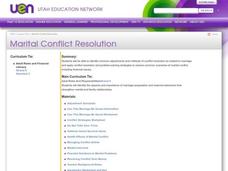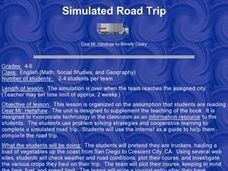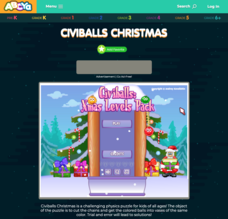Curated OER
Marital Conflict Resolution
While not everybody will end up married, everybody does need to know how to resolve conflict. Learners examine several real-life scenarios involving a married couple. They use problem-solving strategies to help the couple come to an...
Curated OER
Apple Logic and Problem Solving
Young scholars examine apple production in the United States. In this interdisciplinary lesson, students use problem solving strategies introduced to solve math problems associated with apple production in the United States. Student...
Curated OER
The Sum of Our Integer Intelligences
Young mathematicians explore integers. They review adding integers through engaging in mathematical labs. Each lab station is designed to reflect one of the multiple intelligences. Resources for all activities are provided.
US Institute of Peace
Identifying Conflict Styles
Are you a peace-keeper or a problem-solver? Explore conflict management styles through a lesson, fourth in a 15-part series, that combines individual assessment and collaborative work. Groups learn the basic tendencies of each style,...
iCivics
Step Seven: Brainstorm A-Brewin'
Brainstorming—the art of coming up with endless ideas. Pupils brainstorm how to solve local problems in their counties and eventually narrow their ideas down to one solution as a team.
iCivics
Step Eight: Positions, Please!
Everyone sees the results of public policy, but not everyone understands the strategy that goes into creating an effective one. Now that your class understands the brainstorming process from earlier in the series, they continue on to the...
iCivics
Step Nine: Action Campaign
It's time to take action! Learners strategize their action campaigns by using the resource and past brainstorming activities from the series that help them pinpoint problems in their communities. They use included templates to get the...
Curated OER
Simulated Road Trip
Students read the book, DEAR MR. HENSHAW. They implement problem solving strategies and cooperative learning to complete a simulated road trip. Students will use the Internet as a guide to help them complete the road trip.
EngageNY
TASC Transition Curriculum: Workshop 8
Lights, camera, action! Math educators consider how to improve their instruction by examining a model of the five-practice problem-solving model involving a movie theater. Participants examine cognitive demand in relation to problem...
New York State Education Department
TASC Transition Curriculum: Workshop 7
Designed specifically for math instructors, the seventh workshop of a 15-part series allows time to explore Webb's DOK, ponder open-ended questions, and create lessons to apply what is learned. Teachers craft high-quality math problems...
Learning for Justice
Marian Wright Edelman
Marian Wright Edelman's 2014 Commencement Speech at Lewis and Clark College serves to inspire young scholars to investigate a problem in their community, to determine why the problem is important, and then to develop a plan for one thing...
Franklin D. Roosevelt Presidential Library & Museum
Role Playing Relating to Big Decisions
While most high schoolers are too young to vote, they still need to learn the skills needed to solve problems. The ninth resource in a 10-part civics series presents class members with four "What Would You Do?" scenarios that have them...
ABCya
Civiballs Christmas
For the holiday season, timing is everything—and a Civiballs game is no exception! Learners use strategy, timing, and a little bit of computer-generated luck to solve each level of a game in which they cut chains to release ornaments...
Yummy Math
More Chocolate Candy?
Everyone knows that candy is the best part of any holiday—but which holiday's candy gives you the most bang for your buck? Analyze a chocolate heart, a chocolate bat, and a normal piece of chocolate to decide which piece of candy has the...
iCivics
Step 4: Consider the Context
Have you ever noticed how deep the roots of a tree or plant stretch? Scholars analyze the context of an issue and the root causes that go to the base of the problem. The fourth step of a 10-part County Solutions - High School unit shares...
US Institute of Peace
Mediating Conflict
Two's a negotiation, but three's a mediation! Demonstrate the differences between the two processes through a role-playing lesson. The activity familiarizes pupils with the role of a mediator and examines the types of situations that...
WE Charity
Elementary–Module 1: Sustainable Innovation
Where would society be without the innovations of Thomas Edison or Steve Jobs? Scholars explore what it means to have an innovative mindset. Working in small groups, pupils design a product or service to help solve a social,...
WE Charity
High School–Module 5: Transportation Solutions
Planes, trains, and automobiles ... the abundance of today's transportation options comes at a hefty price. Using the fifth and final lesson plan from the WE Are Innovators—High School Modules set, pupils explore how modern...
iCivics
Step 2: Find What You Need
Have you ever searched for something on the web only to get 50,000 results? Scholars analyze ways to break down an inquiry to get specific results. The second installment of a 10-part County Solutions - High School series researches...
WE Charity
High School–Module 1: Sustainable Innovation
What does it mean to have an innovative mindset? Pupils think outside the box with the first of five lessons from the WE Are Innovators—High School Modules set. Scholars read articles and watch videos about sustainable innovation, such...
WE Charity
High School–Module 4: Energy and Housing
What features make a home energy-efficient? Pupils attempt to answer the question with the fourth lesson from the five-part WE Are Innovators—High School Modules set. Scholars learn how certain building materials help save energy. Using...
WE Charity
High School–Module 2: Circular Economy and Nature
Everyone's heard the popular slogan reduce, reuse, recycle, but there may be a better way to talk about sustainability. Using the second lesson plan from the five-part WE Are Innovators—High School Modules series, learners explore issues...
WE Charity
Elementary–Module 5: Transportation Solutions
How does transportation affect the environment? Using the fifth and final lesson from the WE Are Innovators—Elementary Modules series, scholars explore sustainable transportation. Pupils work in small groups to create innovative...
WE Charity
Elementary–Module 3: Food Waste
Before pupils discard anymore of their uneaten vegetables, they may want to learn more about food waste. Here's a resource to help them do just that! Using discussion and video, scholars discover how innovators are tackling the issue. As...























